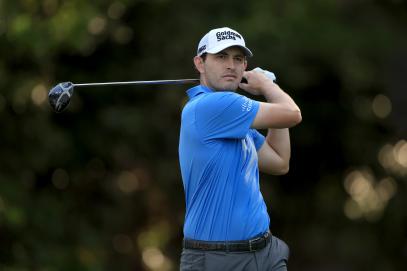There was no shortage of viewers the past two weeks in professional golf. The Masters is annually the most-watched golf event of the year, and the RBC Heritage boasted a loaded field thanks to the tournament receiving the PGA Tour's new "designated" status. However, extra eyeballs means extra scrutiny, as the past two weeks have heightened a recurring complaint with the game: The golf is too darn slow.
That is a key word, “recurring,” for slow-play complaints are nothing new. Yet, the past year of civil war in the professional game has allowed for any and every aspect of the PGA Tour to be evaluated, and one of LIV Golf’s sells to the public is that its product is not as time-consuming as the traditional game. Our Golf Digest editors take a look at the issue and give their thoughts on the matter.
Slow play has been an issue forever. So are recent bouts just a coincidence or sign of a bigger problem?
The problem is metastasizing. Look at the number of early season PGA Tour events in which Thursday and Friday rounds could not be completed even though there were no weather delays. That never happened 10-15 years ago. Everyone has become a tortoise. —Dave Shedloski
It's very hard to know how "bad" the issue has gotten lately. If you believe Patrick Cantlay, the data shows the total time for an average round is staying about the same. Then again, somewhat anecdotally, you see all these stats about how the tour can't get through two rounds of play in two days. In fact, it feels like a lot of this debate is lacking hard numbers, and we're relying mostly on fan experience, like the misery of watching someone stand over a four-foot putt for a full minute, or the sense of slowness on Sunday at Augusta. I do wonder if there's an element of fan culture that demands a more brisk pace, due to shorter attention spans or whatever, and you can see this reflected in things like baseball's new pitch clock or the serve clock in tennis. —Shane Ryan
Remember the 2019 Northern Trust and the slow-play complaints about Bryson DeChambeau, which ultimately led to the Brooks-Bryson feud? Ah, simpler times. The problem—and make no mistake, it is a problem—may not be any worse now than it was then, but it’s certainly not gotten any better. However, I do think other sports embracing ways to speed up their games while golf has stayed pat has amplified the optics of slow play, which is why the complaints may be sounding louder in volume than in the past. —Joel Beall
Patrick Cantlay is bearing the brunt of the slow-play criticism. Is it warranted?
Yes, it's warranted. And yes, the reaction is also a little over-the-top. Though in some ways that goes with the territory. Cantlay is far from the only slower-than-average player on tour, but he's also one of golf's very best players. Top players get more air time and thus more scrutiny. Top players get into contention more, which tends to make them go slower. It's all combined to make him a kind of symbol for a very real issue in golf, which isn't fair to Cantlay. He's an example of a product of the system, not the cause of it. —Luke Kerr-Dineen
On one hand, Cantlay probably doesn't deserve the current level of opprobrium. And the fact that he does heavily reflects the fact that he's so good—if he wasn't in position at Augusta and Hilton Head to be on TV so often on the weekend, nobody would realize how slow he was playing. On the other hand, he is extremely slow, it's no fun to watch, and I think it's more frustration than cruelty driving the criticism. Also, I don't buy the "it's not his fault, it's the system's fault" argument. Sure, he's doing what is allowed under the rules, but just like a Big Ten college basketball coach encouraging his team to play an ugly, physical game that results in final scores in the 40s and 50s, being "within the rules" doesn't excuse someone from contributing to the aesthetic diminishment of his sport. And part of encouraging change, for better or worse, means calling out individual performances. Cantlay has to wear this one. —SR
Someone has to be the poster child. Cantlay is as good a candidate as anyone. Sunday's final group brought into sharp relief how slow Cantlay can play paired with Jordan Spieth, who isn't fast but is faster than Cantlay, and Matt Fitzpatrick whose process should be part of an instructional video for junior golfers. Fitz, the U.S. Open champion, knows how to pull the trigger with little or no delay when it's his turn, and his victory at Harbour Town proves that a deliberate method isn't needed to win. —DS
Cantlay is as painfully slow as a kidney stone, and that he’s not apologetic about his pace doesn’t help. But this is also selective outrage; Jack Nicklaus and Tiger Woods were slow, and Jordan Spieth is no road runner. If fans like the player in question, there’s a bit of latitude allowed, and unfortunately for Cantlay, he’s not in that echelon of popularity to receive such leniency. —JB

Rob Carr
Major League Baseball introduced a shot clock this season to speed up play. Should the PGA Tour consider a similar implementation?
The DP World Tour tried this at a tournament in 2018 and it was considered a unqualified success. Why was it just a one-off experiment? By the way, technically, a shot clock already exists. It's just not something the public sees, and but there is little penalty for violating it. The real question is, should a shot clock with hard and fast policing and penalties be instituted? Easy answer is yes. But, of course, this is a complicated issue. —DS
I'm skeptical of the shot clock in golf because I can't wrap my head around when the clock would literally start. Every pre-shot routine is slightly different, and there's a teeing-order in golf that isn't there in baseball. Plus there's the whole walking-between-shots issue, and the fact that some players have bad holes, which will naturally slow things up. The pitch clock works in baseball, but golf will need to find its own unique solution. —LKD
Pitchers are adjusting to the pitch clock, and baseball is more fun to watch. Tennis players adjusted to the serve clock, and now if a match takes five hours, it's because it's an epic fight, not because Djokovic is taking a minute between serves. In short, yes, assessing serious penalties and implementing a shot clock so it's not some vague subjective judgment is the way to fix this. That said, at a time when the tour is catering to its stars because they fear LIV defections, good luck getting them to implement something that potentially annoys those stars! —SR
Shot clock aside, what can the tour do to speed up pace of play?
Adopt the AJGA's system for its junior golfers, which has figured this out through a system of checkpoints, color-coded warnings and penalties. It's also a system most of these players have played under before. No need to reinvent the wheel here; we're asking players to play golf a tiny bit faster—and there's already a proven system that does that. —LKD
Fire all sports psychologists who convinced golf professionals that they have to institute a "process" before they can hit a shot. Granted, it wouldn't hurt if they stopped tricking up the setups to combat distance and simply cut the rough, stopped putting pins three feet from edges and slowed down the greens a bit. But in the end, too many players have been convinced that a deliberate pre-shot routine is mandatory to hit a quality shot. If that were true, slow play wouldn't be a problem, because it would be all fairways and greens all the time and everyone would fly around the course. —DS
The tour could release wild dogs to chase slow players, or maybe shoot the offending players with a mild tranquilizer dart that makes golf slightly more difficult for an hour or so. In all seriousness, no, a shot clock and real-deal penalties are pretty much the only way to solve this. Half-measures won't do it, because unless there are real stakes, the slow players aren't going to change. —SR
I would like to revisit the wild dogs suggestion, as it would finally put to rest the “Are golfers athletes?” debate. … That said, I do think there’s something to green speed and pin location being at the heart of this. When we followed DeChambeau around the 2019 Tour Championship to see why his rounds were taking so long, putting was the main culprit. Fix this element—less severe pin spots, slower green speed—and the issue may be alleviated entirely. —JB



